12 Best Voice Cloning Software (AI-Powered, Free & Paid)
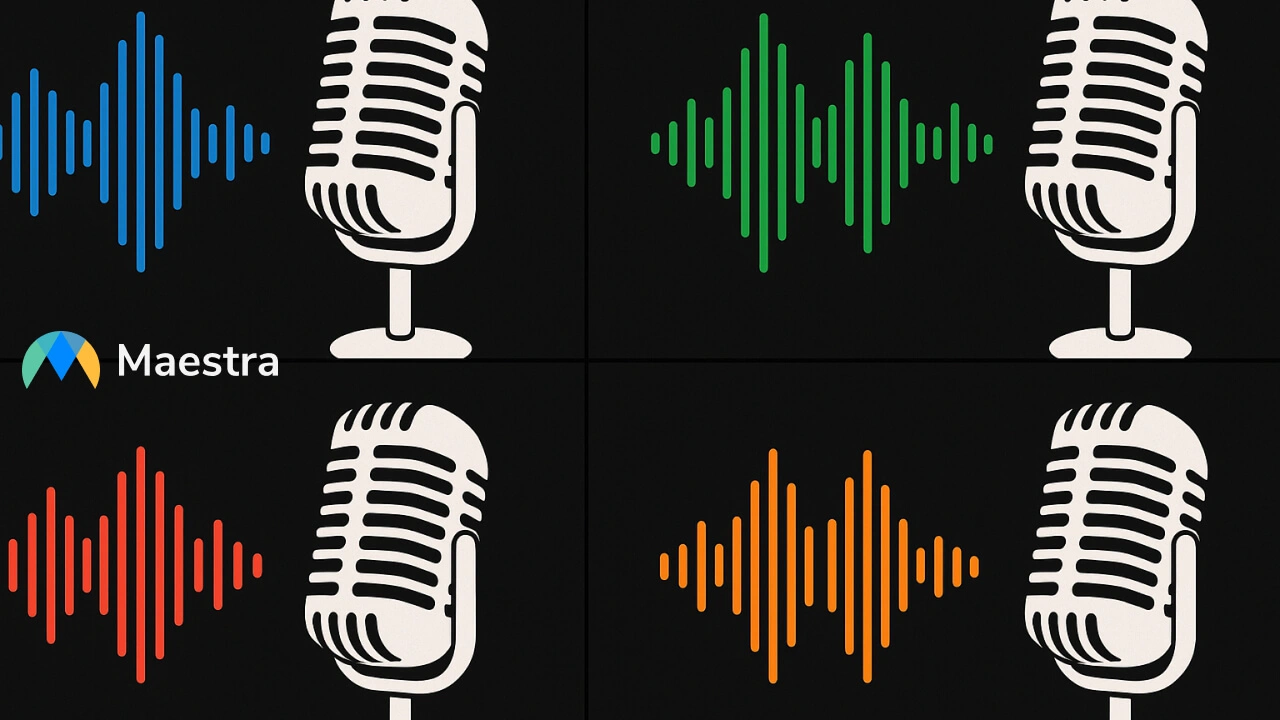
The world of communication is on the verge of a revolution. As one of the latest emerging technologies, AI voice cloning is transforming numerous industries and touching many lives. From creating content for a global audience to providing a voice for those who have lost theirs, the best voice cloning software is paving the way for a more accessible, expressive future.
In this blog, we will share:
- What voice cloning is and the benefits it offers
- 12 best voice cloning software you can try
- Best practices on how to use AI voice cloning tools
Let’s get started.
What is AI voice cloning?
Voice cloning is the process of creating a synthetic voice that replicates a specific person’s voice. When AI algorithms are trained on a person’s voice data, they can learn the unique characteristics of that specific voice. Then, they can generate new speech that sounds exactly like the original person.

Best voice cloning software can accurately capture a speaker’s pitch, tone, and even emotions. By using machine learning techniques (particularly deep learning algorithms), they can analyze and replicate the intricate patterns of speech, ensuring the synthetic voice sounds natural.
5 Key Benefits of AI Voice Cloning
AI voice cloning offers a range of advantages across various fields. Here are five key benefits of this breakthrough technology:
- Content creation for a global audience: Best voice cloning software allows creators to overcome language barriers. By using their own cloned voice, creators can localize their content in different languages and expand their reach.
- Enhanced telecommunication services: Voice cloning technology can provide realistic and personalized voices for automated call services. Compared to traditional robotic voices, these can improve customer satisfaction by sounding more natural and engaging.
- Effortless dubbing and narration: Voice cloning streamlines the dubbing process for movies and TV shows, and can create high-quality narrations for audiobooks and documentaries. This will minimize the need for extensive studio time and reduce the reliance on voice actors.
- Accessibility for people with speech disorders: Voice cloning offers significant benefits for individuals who have lost their ability to speak due to medical conditions. By creating a synthetic version of their original voice, these individuals can communicate in a way that feels natural and familiar.
- Personalized user experiences: Voice cloning can be used to customize voice assistants and other interactive technologies like learning apps. This provides a more relatable and human-like experience, fostering a deeper connection with the technology.
Clone Your Voice in 30+ Languages
12 Best Voice Cloning Software to Use in 2025
With many options available in the market, choosing the best voice cloning software can be challenging. Our list will explore the top contenders of 2025, highlighting each one’s standout feature, use cases, and pricing plan.
| Software | Best For | Star Rating |
| Maestra | YouTube videos, lectures, webinars, sales videos | ⭐⭐⭐⭐⭐ |
| ElevenLabs | Audiobooks, podcasts, video games | ⭐⭐⭐⭐ |
| Descript | Video narration, podcast intros, audiobooks | ⭐⭐⭐⭐ |
| PlayHT | E-learning, game development, wellness apps | ⭐⭐⭐⭐ |
| Podcastle | Podcasts, audiobooks, game development | ⭐⭐⭐ |
| Invideo AI | Marketing videos, corporate presentations, social media content | ⭐⭐⭐ |
| Speechify | Ad reads, earnings calls, company announcements | ⭐⭐⭐ |
| Resemble AI | Video content, audiobooks, podcasts | ⭐⭐⭐⭐ |
| Uberduck | Entertainment content, short-form videos, ad reads | ⭐⭐⭐ |
| HeyGen | Marketing, sales, and learning & development videos | ⭐⭐⭐⭐ |
| VEED | Internal comms videos, educational materials, presentations | ⭐⭐⭐⭐ |
| Murf AI | Enterprise use | ⭐⭐⭐ |
1. Maestra
Speaking in another language couldn’t be simpler. Maestra’s AI voice cloning tool can instantly replicate your voice and translate it into over 30 different languages by leveraging advanced models like DeepL and OpenAI. While doing so, it maintains your unique tone and personality, helping you keep your branding consistent across your content and reach a global audience.
All you have to do is upload an audio file where you speak for at least a few minutes, and then choose the target language. The tool will generate your cloned voice, and you can export it in the format you prefer. Maestra allows you to translate and dub both video and audio files, or use its text-to-speech technology with your cloned voice.
Standout feature: AI lip syncing, which synchronizes lip movements with on-screen visuals
Pricing: Available with Premium, Business, and Business Plus plans. See more on pricing here.
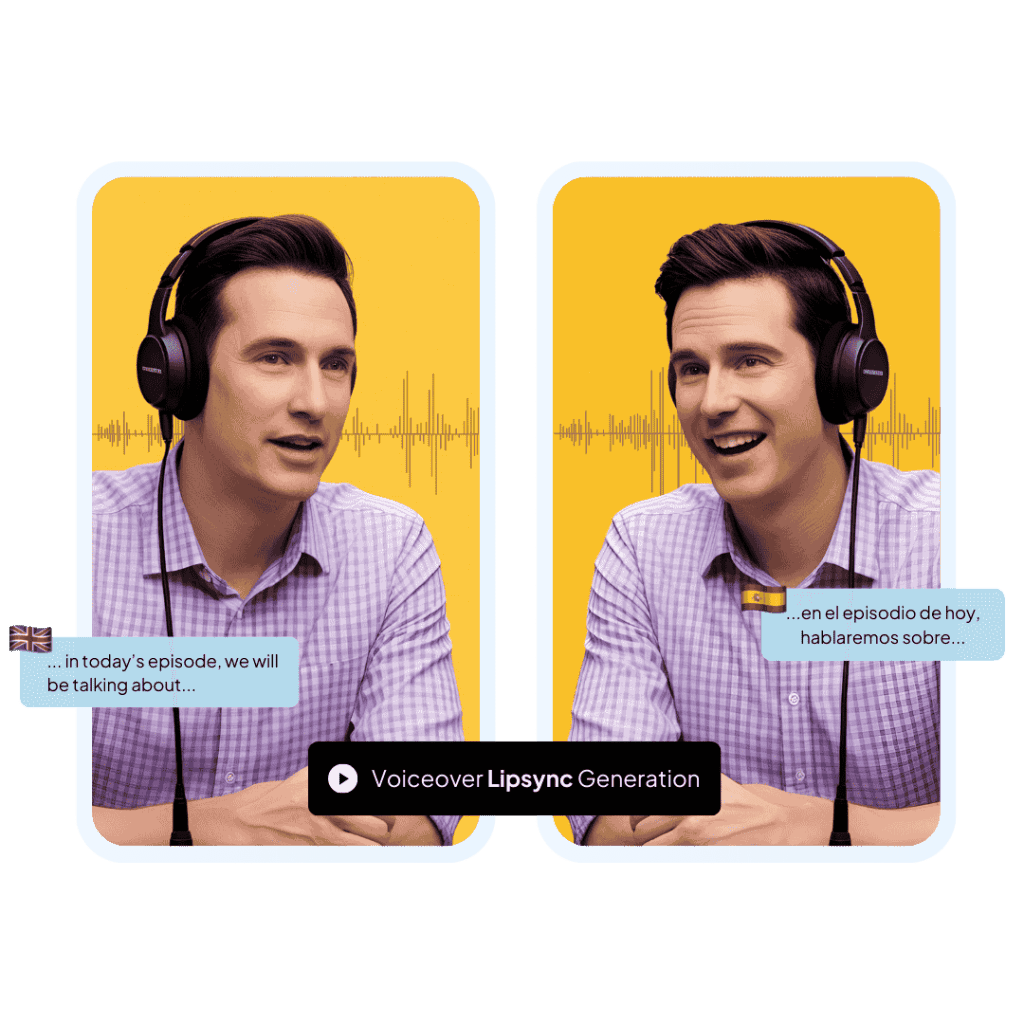
2. ElevenLabs
ElevenLabs’ voice cloning tool is fast and realistic. Depending on your needs, you can choose between Instant or Professional voice cloning options. Plus, you can upload a sample of your voice and then type in the text you want to convert to speech. The tool will clone your voice and generate high-quality audio in one of its supported 29 languages.
Standout feature: Professional Voice Cloning, which offers more identical results than Instant Voice Cloning
Pricing: Starter plan allows you to clone your voice with as little as 1 minute of audio. See more on pricing here.

3. Descript
In Descript’s voice cloning AI, you’ll be prompted to read a short, 90-second script. The tool will then process your voice sample, and your voice clone will be ready to use. You can now write a script or use AI to generate one, and assign it to your newly created voice clone. During editing, Descript can detect and remove filler words, ensuring you get polished audio content.
Standout feature: easy audio regeneration by fixing words within the text editor
Pricing: Creator plan offers AI voice cloning with 1,000 word vocabulary. See more on pricing here.

4. PlayHT
PlayHT’s voice cloning software can deliver emotionally diverse and professional vocal performances. Your voice will be submitted for cloning once you upload at least 1 hour of your speech. (2-3 hours would be ideal though.) After a few hours, you can use the tool’s text-to-voice editor to generate and browse multiple voice cloning samples, and select the perfect one for your needs.
Standout feature: no limit on the number of words you can convert in the text-to-speech editor
Pricing: Free plan offers 1 instant voice clone.

5. Podcastle
Podcastle’s AI voice cloning tool Revoice has a simple, user-friendly interface. You will be prompted to record yourself reading 70 sentences. Within 24 hours, Revoice’s AI model will process your sample and create a digital copy of your voice. The tool will deliver natural cadence, tone and emotions, ready to captivate your audience.
Standout feature: seamless integration into various platforms and projects
Pricing: You need the Pro Plan to access Revoice. See more on pricing here.

6. Invideo AI
Time is valuable, and Invideo AI’s voice cloning tool delivers rapid results. All you have to do is upload at least a 30-second recording of your own voice. You will get a realistic clone in seconds, which you can incorporate into your video projects. Feel free to use your cloned voice for various purposes, ranging from explainer videos to social media content.
Standout feature: integration of your cloned voice into your Invideo projects
Pricing: Plus plan offers 2 voice clones. See more on pricing here.

7. Speechify
Speechify is another easy-to-use voice cloning software with zero learning curve. You can import your voice by recording it right in your browser or uploading a file. Then you can type or paste a script into the text box and instantly convert it to speech. You can now listen to the text in your cloned voice, change the speed and tune your voice to sound sharper.
Standout feature: addition of emotions to your AI voice
Pricing: You can try Speechify voice cloning for free. See more on pricing here.

8. Resemble AI
With Resemble AI, you can clone your voice in two different ways. Rapid Voice Cloning method, which prioritizes speed and efficiency, allows users to create a custom voice clone with a small audio sample lasting from 10 seconds to 1 minute. Meanwhile, the Professional Voice Clone feature focuses on depth and nuance, and typically requires 10 minutes of an audio sample.
Standout feature: Advanced Voice Cloning, which captures every nuance of your voice
Pricing: Creator plan offers 5 Rapid voice clones and 1 Professional voice clone. See more on pricing here.
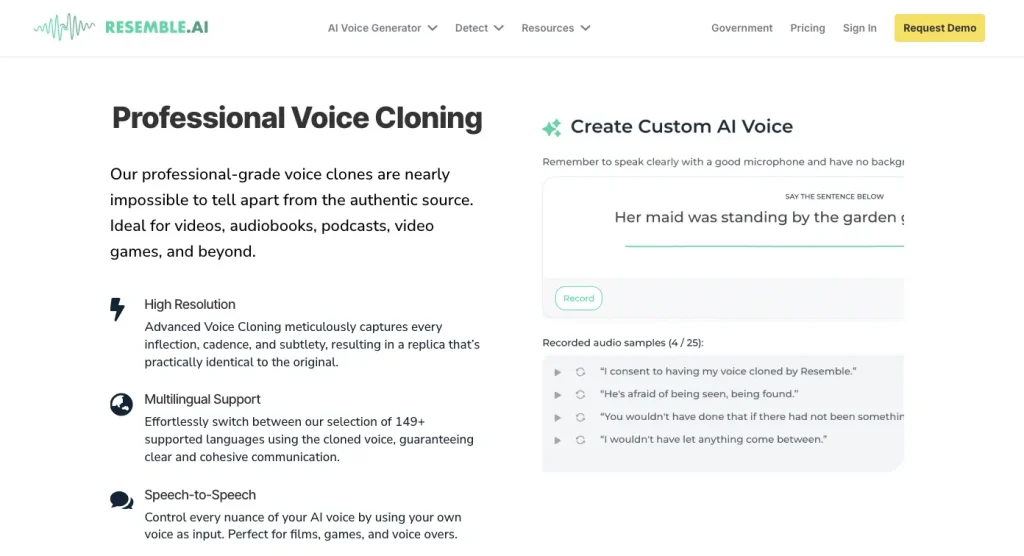
9. Uberduck
As one of the best voice cloning software, Uberduck is mobile-friendly, so you can create audio even on the go. The platform highlights that they achieve “95% of similarity to the original voice”, demonstrating a high-level of accuracy in replicating tone, style, and speech patterns. The process is also very quick and requires just a few seconds of audio.
Standout feature: Realistic singing and rapping voice conversion
Pricing: A free tier is available if you choose an annual plan. See more on pricing here.

10. HeyGen
In HeyGen, when you create a Custom Avatar, the platform can also generate a voice clone of you. Supporting 25+ languages, it only takes 2 minutes of recorded footage to create your personalized AI voice. Thanks to HeyGen’s advanced lip-sync technology, your cloned voice will seamlessly match your avatar, speaking naturally and in a manner similar to you.
Standout feature: Voice clones paired with a custom avatar
Pricing: You need the Creator plan to access the voice cloning feature. See more on pricing here.
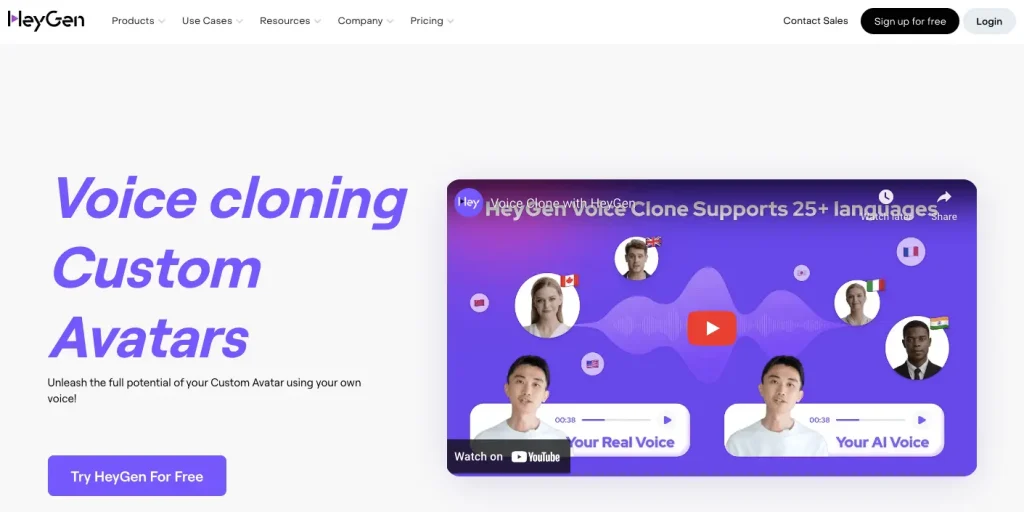
11. VEED
Primarily an AI video editor, VEED stands out among voice cloning tools with its user-friendly approach. Simply read a short script, and the platform accurately clones your voice, making it easy to create consistent and personalized audio for your videos. In addition to voice cloning technology, VEED offers powerful AI-driven features including text-to-video and talking avatars, giving users the ability to generate engaging videos from simple text prompts.
Standout feature: Seamless integration with VEED's comprehensive suite of video creation tools
Pricing: Free trial available; Pro plan unlocks full voice cloning functionality. See more on pricing here.
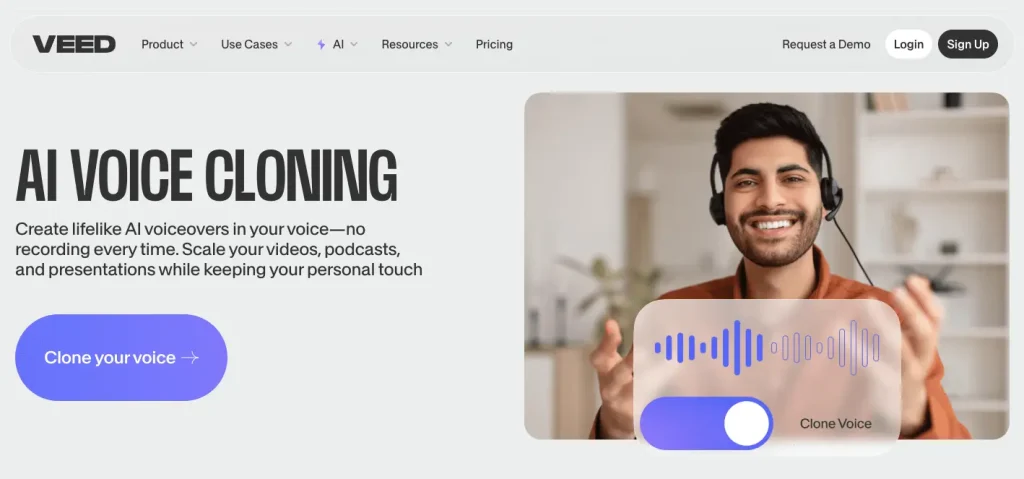
12. Murf AI
Designed with enterprise needs in mind, Murf AI's voice cloning tool is capable of mimicking human emotions, adding a layer of realism to audio content. Its customization features allow users to fine-tune their cloned voices to express different emotions and adjust pitch, tone, speed, and more. Additionally, users can craft and refine voiceovers directly from scripts, streamlining the production process.
Standout feature: Enterprise-grade AI voice cloning with emotional realism and granular voice customization
Pricing: Contact Murf AI for a custom quote.

How to Use AI Voice Cloning Tools: Best Practices
We’ve listed the 12 best voice cloning software online; now let’s emphasize the importance of using them responsibly. Keep the following tips in mind for a productive, secure, and ethical voice cloning experience:
- Use AI voice technology in appropriate contexts. It can be a powerful tool for content creation, educational purposes, and assisting people who have lost their voices. However, adopt this technology only in situations where it adds value or enhances the user experience.
- Train the AI with high-quality audio. The quality of your cloned voice directly depends on the training data. Invest in clear recordings with minimal background noise and ensure the speaker’s voice is the only one present.
- Write clear and concise scripts. Even the best voice cloning software can struggle with long sentences and complex phrasing. Provide scripts that are easy to understand and deliver the intended message effectively.
- Test and refine before going public. Don’t release a cloned voice until you’re confident in its quality. Test it with different scripts and identify areas for improvement.
- Always obtain consent before cloning someone else’s voice. Be explicit about how their cloned voice will be used. This will not only respect their personal rights but also help avoid legal issues for both parties.
- Secure your data. Implement measures to protect your cloned voice from unauthorized access and misuse. This is especially crucial if the voice belongs to someone else and you're entrusted with its safekeeping.
- Be transparent. Make sure you inform viewers and users if you’re using a cloned voice in the content or service you provide. This will build trust and foster a sense of genuineness.
- Stay updated. The field of AI voice cloning is rapidly evolving, and so are the ethical considerations and regulations surrounding it. Being informed allows you to make responsible decisions and embrace the technology wisely.

Frequently Asked Questions
What is the best AI voice cloner?
Maestra is the best voice cloning software due to its ease of use and short turnaround time. With Maestra, you can easily clone your voice in 29 languages to break language barriers and reach a global audience. Besides AI voice cloning, the platform also offers highly-realistic AI voices in 125+ languages for various use cases.
How does AI voice cloning software work?
The first step involves collecting a substantial amount of audio data from the target speaker. Then, the AI will analyze this data to learn the unique characteristics of that specific voice, and use its understanding to generate synthetic speech. Best voice cloning software usually offer additional features, such as techniques to make the voice sound even more natural.
Do I need any technical skills to use AI voice cloning tools?
No, you don’t need technical skills to use AI voice cloning technology. Most tools are designed for casual users, with intuitive interfaces and simple steps to generate speech. These platforms often provide guides or templates, making the process easy even for beginners.
Can AI voice cloning tools create realistic voices in multiple languages?
Yes, many AI voice cloning tools can generate realistic voices in multiple languages, making them ideal for content creation across global markets. Tools like Maestra often support popular languages such as English, Spanish, French, and Mandarin, with increasing options for regional dialects. With the ability to clone your own voice across languages, these tools offer a personalized and scalable solution for multilingual content.
How long does it take to generate a cloned voice with AI?
The time it takes to generate a cloned voice with AI varies, but with most voice cloning technology, the process is surprisingly quick. Once an audio sample is recorded, the system typically requires only a few minutes of processing time to generate a functional voice model. However, more complex voice cloning setups might take longer, depending on the quality and customization of the output.
How accurate is AI voice cloning?
AI voice cloning has reached impressive levels of accuracy. Nowadays, leading AI models can mimic a voice’s emotional tone and pitch with great detail. However, the precision of the clone still depends on the quality of the data and the technology used.
Can AI voice cloning be detected?
Cloned voices can be very realistic, making it difficult to distinguish them from real recordings. Subtle imperfections might be hard to catch, especially with the best voice cloning software. However, there are powerful detection methods like voice biometrics and speech pattern analysis. In short, it depends on the quality of the clone and the sophistication of the detection method.
Is voice cloning illegal?
The legality of voice cloning depends on how it’s used. It’s generally okay if you have permission from the person whose voice you’re cloning. However, always be cautious and ensure the cloned voice is used ethically and transparently to avoid any misunderstandings or legal issues.
What are the top use cases for custom voice cloning?
Custom voice cloning is perfect for video creators who want to add consistent and personalized audio to their content. It’s also great for audiobook narration, making it easy to produce natural-sounding, professional audio. Plus, it streamlines making podcasts, letting creators generate high-quality speech without spending hours recording.
Summary
This blog shared 12 best voice cloning software to help you replicate your own voice. It also emphasized the benefits this groundbreaking technology offers, and how to use it efficiently and ethically.
Responsible development will be key to AI voice cloning, which is expected to become much more realistic in the future. This can lead to new applications in various fields, ranging from entertainment and media to education and assistive technologies. With careful consideration of ethical implications, voice cloning has the potential to reshape how we interact with technology and information.




